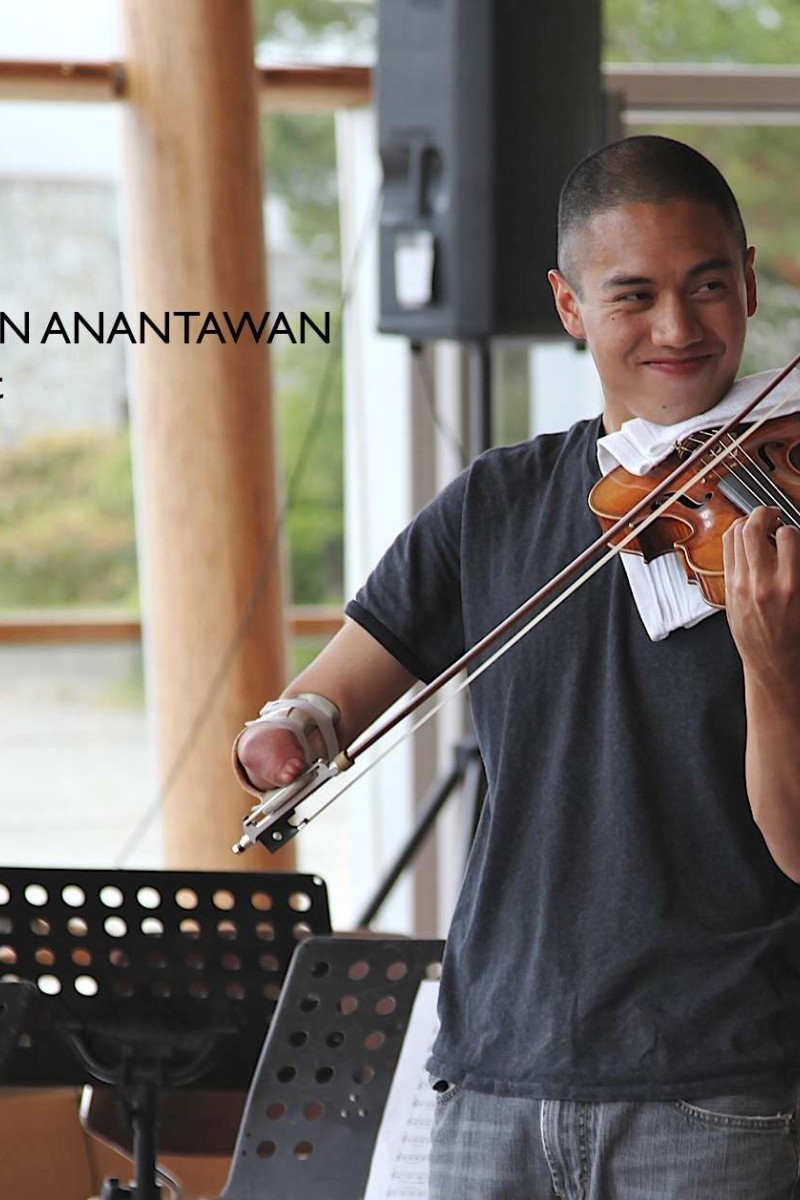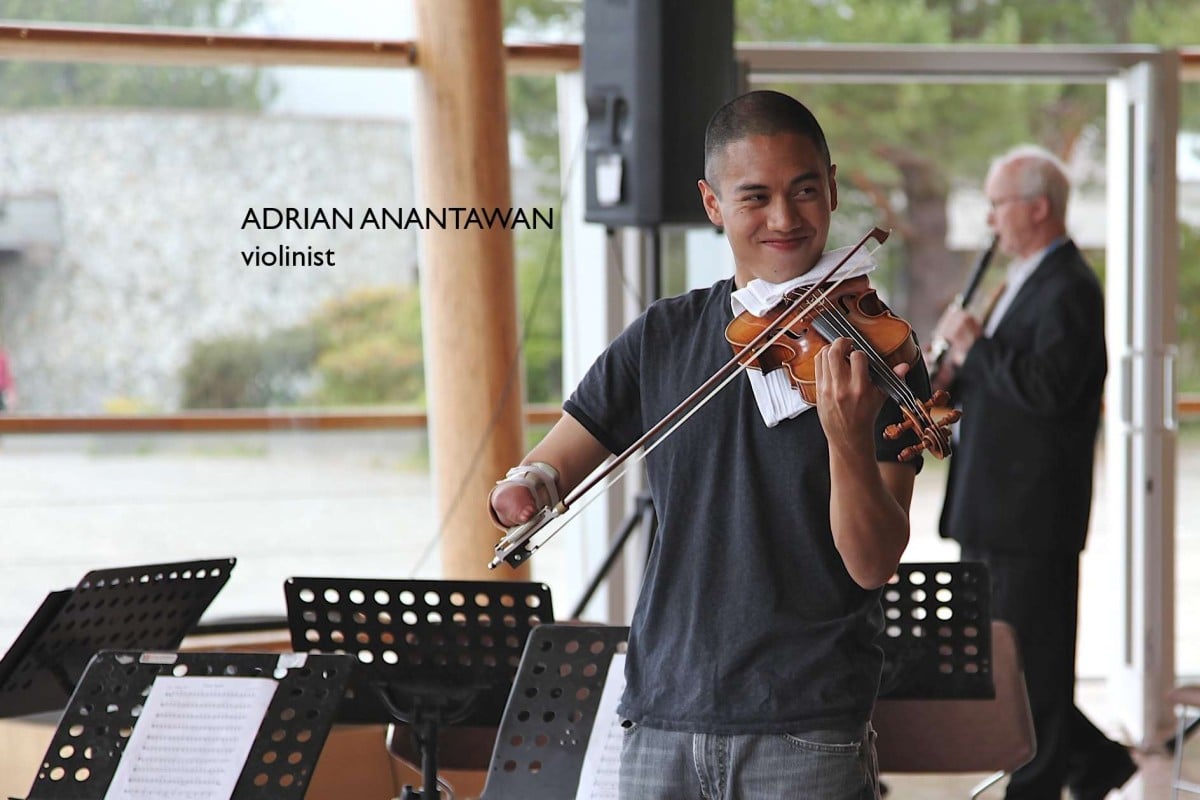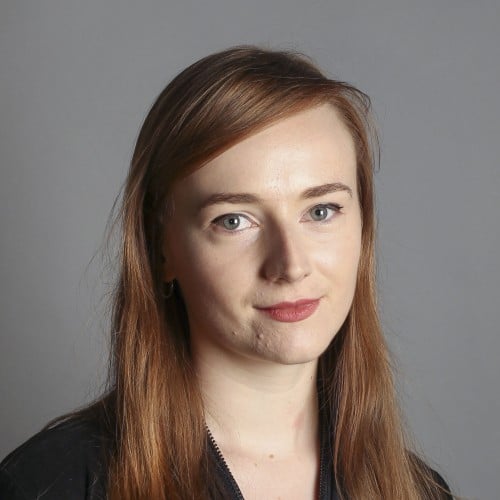
Canada’s bionic violinist, Adrian Anantawan, tells Hong Kong students about overcoming challenges to live your dreams
 Adrian Anantawan brings a message of hope to students in Hong Kong.
Adrian Anantawan brings a message of hope to students in Hong Kong.Adrian Anantawan has accomplished things most able people never even dreamed of. The Canadian performer became an acclaimed concert violinist with degrees from both Harvard and Yale. When he was a teenager, he became one of the youngest members ever to join the National Youth Orchestra of Canada, and he has performed for Pope John Paul II and the Dalai Lama.
And he’s done it all with out his right hand.
Young Post met the 33-year-old when he came to Hong Kong to visit schools and chat with students. He crowned his stay with a concert, organised by the PMA Music Foundation last Sunday. He performed with the Metropolitan Youth Orchestra, St Stephen’s College Preparatory School choir, and three student violinists who are autistic.
Many parents of children with disabilities are afraid to push their children to success, but Anantawan’s mum and dad made sure their son had the same opportunities as any other child. In a first for one of Anantawan’s performances, his mum, who is originally from Hong Kong, gave a speech during the concert about raising the eldest of her three sons, and helping him through the challenges he’s faced. Anantawan felt it was important to include this, as “there are lots of parents in the community who are looking for advice on raising their child to become successful in the face of challenge or adversity. My challenge is an obvious one because of the way I was born, but there are so many challenges I hear young Hongkongers are going through now – such as exam pressure.”
If he had grown up anywhere else, Anantawan might not be where he is today. But thanks to a government-funded programme in Canada, he had a special prosthetic device tailor made to help him hold a bow. “A lot of governments will fund prosthetics only if they’re proven to be essential for living in some way, such as a leg to help someone walk,” he explains. “But you wouldn’t be supported to, say, get a specially-designed leg that helps you to swim faster, as it’d be deemed recreational and not essential. But Canada has these programmes, like the War Amps, which support recreational devices for kids who want to experiment.”
Anantawan’s father played violin, and music was important to both of his parents. When he was nine, his class at school was learning the recorder, which he couldn’t play as he didn’t have enough fingers. Instead, his teacher suggested that he try composing music, or just watch the other children perform. “But it was important for me and my parents that I was performing music, just like everyone else,” he says. They chose the violin, as they loved how it sounded, and didn’t think twice about their son’s disability holding him back. Their philosophy, he says, was: not to worry about what was practical. It was more important to do what you want first, and then work out the details of how to adapt the instrument later.
“It wasn’t that anyone was telling me I couldn’t do it, it’s just there weren’t examples of people who’d adapted the violin before,” he explains. “There wasn’t anyone like me playing violin at a professional level.
But Anantawan found a role model in Itzhak Perlman, the famed violinist who grew up with polio, after seeing Perlman playing violin alongside a young girl on the children’s TV show on Sesame Street. “They both had to walk up some stairs to get to a stage,” he recalls. “The girl ran up very easily, and Perlman had to use his crutches. But then he performed a far superior piece than the girl’s. The idea was that some things are hard for you and easy for me, and vice versa. I love that idea of changing the framework. We all have our strengths and challenges.”
Respecting someone with a disability is about striking a balance between both appreciating and being mindful of their differences. For those perceived as different by their peers, bullying can be a problem, as well as dealing with people’s lowered expectations, or worse, pity, Anantawan says.
“I met one girl who was missing an arm. All of her friends insisted on carrying her books and backpack for her, but she didn’t want that extra help,” he says. “She could easily do it on her own, but the other kids just wanted to be nice. So it’s about understanding that if you want to help, you need to ask first, to see what help someone needs.”
Music gave Anantawan an environment he truly felt comfortable in. “Sports is always about who’s taller, faster, stronger, but music isn’t about that,” he explains. “It is an avenue not only to do something fun and learn an instrument, but also to connect with other people and know myself better. Music allows you to see beyond outward appearances.”
After gaining several music degrees and building his profile as a performer, Anantawan decided to go back to school and study education. These days, he performs less, and spends more time meeting children, many of whom have a disability. After sharing his story and performing a piece, he leaves lots of room for questions. “I get asked: ‘Does it hurt?’ ‘Were you ever teased?’ ‘How do you play so fast?’ They’re very honest questions,” he says.
The violinist says he’ll always play and keep polishing his skills, but he believes that teaching and performing aren’t so far apart.
“Both require you to create memorable experiences for other people,” he says. “It’s not about proving yourself, but sharing ideas and reaching out to your audience at their level.”
Edited by Sam Gusway
